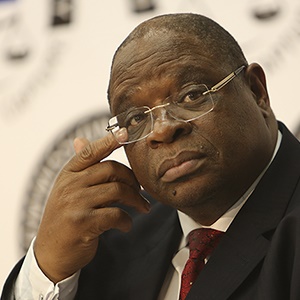
"She doesn't fully understand how the
legal system works as she has never practiced as an advocate."
These were the words of attorney Comfort Ngidi in 2014, referring to the then public protector Thuli Madonsela.
Ngidi, a Zuma loyalist who led a group of "concerned" KwaZulu-Natal lawyers on a campaign to discredit Madonsela's personal integrity as well as her Nkandla report, is on the verge of being appointed an official of the state capture commission of inquiry.
The inquiry, chaired by Justice Raymond Zondo, is an outcome of the State of Capture report written by Madonsela who, according to Ngidi, "doesn't fully understand how the legal system works".
Since the highest court in the land, the Constitutional Court, vindicated Madonsela on the Nkandla report, Ngidi hasn't said who, between him and Madonsela, "doesn't fully understand how the legal system works". Nor has he conceded that Madonsela "fully understands how the legal system works".
He has never said whether Madonsela's supposed lack of understanding of how the legal system works applies to the 11 justices of the Constitutional Court who ruled in favour of her report and analogically described her in the judgment as a biblical David who was up against a Goliath.
That Ngidi was on the side of Goliath is a well-known fact. What is not known – and can never be known until the damage is done – is the extent to which Ngidi will be prepared to do the bidding for the Goliath of Nkandla if he is appointed assessor of evidence in the state capture commission of inquiry.
Yet, Zondo is considering appointing him to work in an inquiry whose terms of reference and its powers were framed by Madonsela "who doesn't understand how the legal system works".
It gets worse when we consider the fact that the subject of the inquiry is Zuma who, we should assume Ngidi believes, understands fully how constitutional democracy works. Every allegation of state capture that has to be tested directly or indirectly points to Ngidi's political idol.
All evidence that has to be assessed in the final analysis has to do with how Zuma, by omission or commission, outsourced control of the state and its resources to the Guptas and their allies to the detriment of the country. The Mail & Guardian reported on Friday that both Ngidi and Zondo had confirmed Ngidi's pending appointment.
Even if Ngidi is never appointed, the mere fact that Zondo is considering him is a reason for extreme concern. Should the appointment go ahead, it would the first blunder Zondo would have committed. It would do serious harm to the credibility of the commission.
Given the justifiable anger state capture has provoked among South Africans, some of whom risked their lives to expose it, the last thing that the country needs now is the discrediting of the inquiry that is meant to restore the rule of law.
Many people doubt whether it would yield anything. Given the whitewash that became of the Arms Deal Commission, the lack of substantive outcomes following the Marikana Commission and the disregard for the recommendations of the Fees Commission, cautious optimism is justified. Zondo must not dash the little hope there is in the state capture commission. He should build on it.
He must also realise that if the commission is discredited as a result of his actions, his own personal integrity would be on the line. He surely wouldn't want to unwittingly sabotage a commission he is heading.
Zondo should appreciate that although many South Africans see the commission as the last hope, their optimism is shaky. They are adopting a wait-and-see approach.
To ensure the credibility of the commission would require him to see his leadership beyond strictly being a judge who is interested in evidence presented before the commission. The very nature of his powers as chairman of the commission, which include staffing, could make or break the commission's credibility.
Zondo has the opportunity to make history. There is no middle ground. Either the commission becomes a spectacular failure and joins ranks of financially wasteful inquiries or it becomes a spectacular success, and sets a precedent for future commissions of inquiry.
Although by its very nature, the commission was tasked to investigate far more complex matters, it has several advantages not enjoyed by other commissions before it. The first is that it was not established as a presidential prerogative, but as a directive of the public protector and endorsed by the high court. Presidential manipulation is therefore limited – at least theoretically.
Second, it has powers above those that would ordinarily apply to a commission of inquiry set up by the president as his/her own discretion.
Third, it has specific issues to be investigated that the president cannot amend since it was not established at his behest.
Fourth, its powers are no less than those of the public protector's. This means its recommendations are binding unless set aside by a court of law.
Fifth, the head of the commission was not chosen by the president but by the chief justice, giving it extraordinary independence.
Lastly, there is huge public interest which means the commission is watched from every angle. Civil society organisations that have been in and out of courts and on the streets to enforce the rule of law, even as Ngidi and his "concerned" comrade were moving to the opposite direction, are watching it.
Should Zondo appoint Ngidi, civil society will have to approach the courts to interdict him. Sadly, this could derail the commission's work.
- Mkhabela is a political analyst with the Department of Political Sciences at the University of South Africa.
Disclaimer: News24 encourages freedom of speech and the expression of diverse views. The views of columnists published on News24 are therefore their own and do not necessarily represent the views of News24.




 Publications
Publications
 Partners
Partners

























